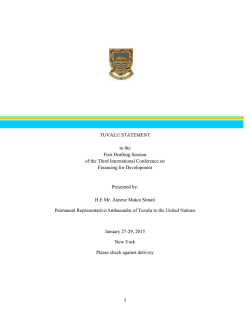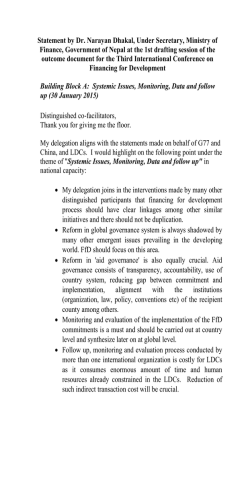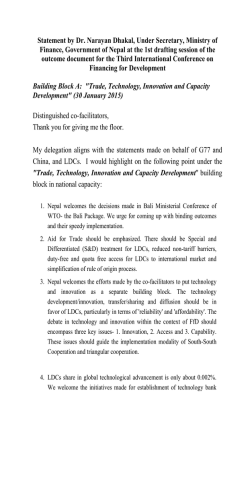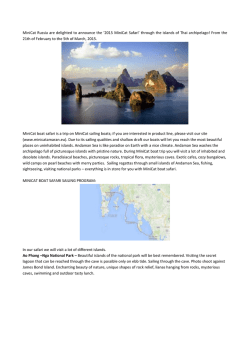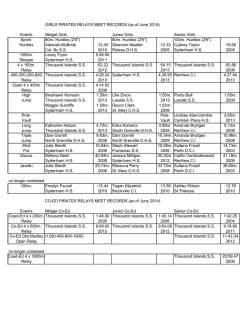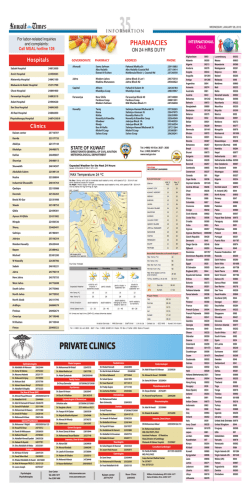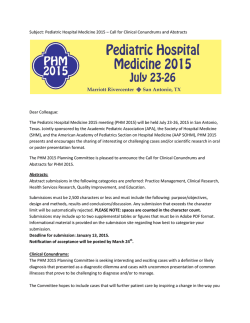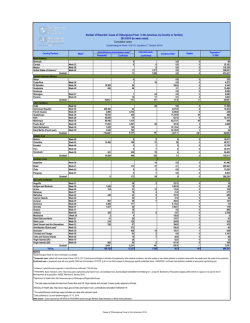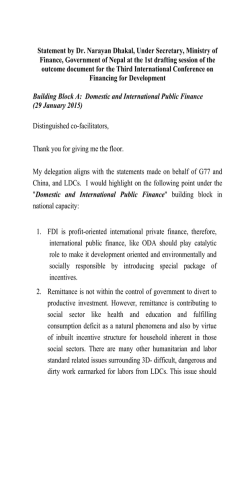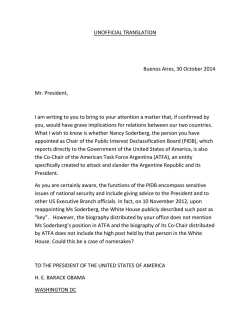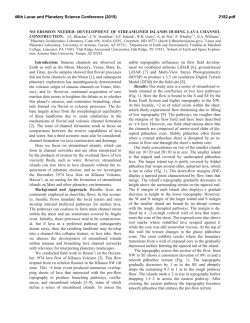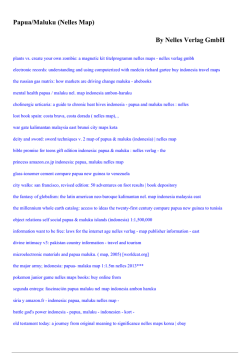
PACIFIC SMALL ISLAND DEVELOPING STATES United Nations
PACIFIC SMALL ISLAND DEVELOPING STATES United Nations Member States Permanent Mission of the Kingdom of Tonga to the United Nations, 250 East 51st Street (between Second and Third Avenues) New York, N.Y. 10022 Phone: +1 (917) 369 - 1025 Fax: +1 (917) 369 - 1024 E-mail: [email protected] Statement of H.E. Mr. Robert G. Aisi, O.B.E. Permanent Representative of the Independent State of Papua New Guinea On behalf of the Pacific Small Island Developing States for “General discussion: views on the elements and the zero draft” at the First drafting session of the Preparatory Process for the Third International Conference on Financing for Development New York, Wednesday, 28th January 2015 CHECK AGAINST DELIVERY Co-Chairs, I have the honor to speak on behalf of the 12 Pacific Small Island Developing States (PSIDS) with presence at the United Nations. We align ourselves with the statement delivered by Maldives as Chair of the Alliance of Small Island States (AOSIS), and for those of us that are members of the Group of 77 and China, with the statement delivered by South Africa as Chair of that Group. At the outset, we would like to thank the Co-Facilitators for their informative “Elements-Paper.” In the spirit of this paper, we found it highly stimulating of further thought, and a feasible basis to a zero draft. PSIDS believe that the Third International Conference on Finance for Development (FfD) provides a timely opportunity to identify and address the gaps in the current framework; and especially to adopt a new FfD framework that will incorporate the special needs of Small Island Developing States such as the members of PSIDS. Only then can we acknowledge it to be a stronger and more inclusive financial framework. Co-Chairs, As noted in the S.A.M.O.A. Pathway, the outcome document to the Third International Conference on Small Island Developing States, SIDS remain a special case for sustainable development in view of their unique and particular vulnerabilities. There is no doubting the merits of the SIDS’s "special case", defined largely by small size, extreme isolation, limited and narrow resource bases, geographic dispersion and isolation from markets, diseconomies of scale, capacity limitations, susceptibility to climate change and natural disasters, and global crises. This “special case” needs to be a key consideration for the FfD process. Federated States of Micronesia, Fiji, Kiribati, Nauru, Palau, Papua New Guinea, Marshall Islands, Samoa, Solomon Islands, Tonga, Tuvalu, Vanuatu The S.A.M.O.A Pathway provides key asks and commitments by the international community to SIDS and we therefore welcome the Co-Chairs’ reference in your paper to the outcome document given the important relationship between the FfD framework and the S.A.M.O.A Pathway. However, as noted by the Development Co-operation Directorate of the OECD in February 2013, many SIDS remain “aid orphans.” Too often ODA is inefficiently deployed, travelling through too many middlemen or unproductively earmarked. We call for streamlining mechanisms of financing so that they reach targeted communities to positively impact their lives through implementation of projects on the ground. To that end, more multilateral finance should be drawn from core sources, in contrast to the current situation where between 50 and 80 percent of Pacific regional program funds are earmarked by donors. Making financing work for PSIDS means it must be accessible, predictable, and aligned with national development strategies and priorities. Such changes to the way assistance is given and received goes hand in hand with strengthened monitoring and accountability mechanisms, to make sure that development assistance is truly having its desired impact. SIDS are deserving of explicit targets, as “vulnerable countries,” for an increased share of ODA. Co-Chairs, As noted in the S.A.M.O.A Pathway, international cooperation and partnerships of various kinds and across a wide variety of stakeholders are critical for the implementation of sustainable development for SIDS. Such partnerships should be based on the principles of national ownership, mutual trust, transparency and accountability. We reaffirm that North-South cooperation remains the core type of international cooperation and that South-South cooperation is not a substitute for, but rather a complement to, North-South cooperation. PSIDS notes and will follow with interest the idea of using partnerships in development cooperation and the increasing of the effectiveness of aid and development cooperation as highlighted in your paper. Moreover, such partnerships must be genuine and durable, as highlighted in the S.A.M.O.A Pathway. Co-Chairs, We echo the G77 in calling for a universal, rule-based, open, non-discriminatory and equitable multilateral trading system as one of the key deliverables in the Addis Ababa Outcome Document. Given the outsized reliance on trade to fuel island economies, SIDS are worthy of specific examination as a special case that can benefit from reforms to international trade regimes. Highpriced imports place a burden on Pacific households given variable global prices. The ability among Pacific countries to successfully benefit from trade negotiations is hampered by weak national and regional capacities on various technical issues and the inability to translate regional commitment into supporting national legislation and policies or actions. Trade enhancement capacity building investment would contribute to boosting trade, strengthening domestic economies and complement the sustainable development of PSIDS. Federated States of Micronesia, Fiji, Kiribati, Nauru, Palau, Papua New Guinea, Marshall Islands, Samoa, Solomon Islands, Tonga, Tuvalu, Vanuatu 2 PSIDS strongly approve of the proposal in the annex to the co-facilitator’s “elements” document to help LDCs and countries in special situations like SIDS, benefit further from international trade especially through actions to “remove/ [or] reduce fisheries subsidies.” We would, in particular, look at removing subsidies that contribute to illegal, unreported, and unregulated fishing, overcapacity and overfishing, and harmful and destructive fishing practices. Eliminating such subsidies is critical to achieving healthy fish stocks, which PSIDS depend on for its livelihood. Co-Chairs, We further support many of the proposed policies under the header of “technology, innovation and capacity building.” Specifically, measures to address technology gaps in developing countries, including through the creation of a “facilitation mechanism to promote the development, transfer, and dissemination of clean and environmentally sound technologies on concessional and preferential terms.” Such a mechanism is also needed to increase connectivity and use of information and communications technology through improved infrastructure, training, and national legislation, as well as public and private sector involvement. Such financing should target the energy sector. We are seeking accelerated actions to increase the use of renewable energy sources, including solar and wind. In 2013, Pacific Leaders committed to meeting half of their energy using renewable sources, which can in turn reduce the dependence on petroleum imports. A transition to sustainable energy has cross - cutting benefits, including increasing access, reducing costs, reducing greenhouse gas emissions, and healing the planet. As noted in your paper, external shocks, including natural disasters, cost billions of dollars to address and threaten achievements in sustainable development. We call for financing to support building resilience to such shocks, including through training and capacity building to build resilient institutions that can respond to such events. Co-Chairs, With regard to monitoring, data, and follow-up, we would again ask for proper consideration of national capacities, and access to data, and special attention to the case of SIDS. As noted in the OECD report cited earlier, currently no SIDS figure among the top 15 recipients of aid targeted to support the development of national statistical systems. We therefore support work to enhance capacity building and financial support to developing countries, including SIDS, to increase the availability of data. Additionally, follow up and review requirements under the agreement should not constitute new burdens for SIDS and developing counties in general. Where possible, data should be sourced from regional organizations rather than creating additional reporting requirements. Co-Chairs We note that the relationship between the FfD process and that of the “means of implementation” component of the post-2015 sustainable development agenda, is still taking shape. We look forward to further clarity in the linkages between these two important processes. Federated States of Micronesia, Fiji, Kiribati, Nauru, Palau, Papua New Guinea, Marshall Islands, Samoa, Solomon Islands, Tonga, Tuvalu, Vanuatu 3 Finally, Co-Chairs, sustainable development and climate change are inextricably linked. The FfD should not rely on existing agreements to finance mitigation of, and adaptation to, climate change, but should add value to existing agreements. Financial mechanisms such as the Global Climate Fund (GCF) and the Global Environment Fund (GEF) must continue to ensure that special arrangements are dedicated to meet the special vulnerability of SIDS. The principle governing climate finance must be additionality, as the additional costs of climate change require new and additional financing. We therefore concur with you Co-Chairs, that the synergies between ODA and climate finance must be further enhanced. In this respect, we also believe that the FfD outcome document must reaffirm the commitments made in the Monterey and Doha documents. I thank you Federated States of Micronesia, Fiji, Kiribati, Nauru, Palau, Papua New Guinea, Marshall Islands, Samoa, Solomon Islands, Tonga, Tuvalu, Vanuatu 4
© Copyright 2026
